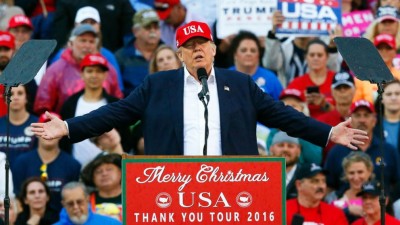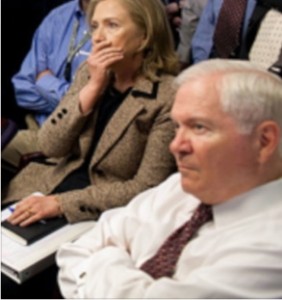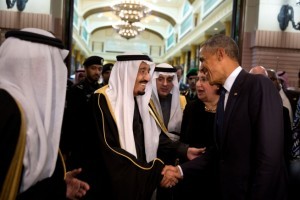The Good That Trump Could Do. Breaking the Grip of the Neocons over US Foreign Policy

Despite fears about the many negatives from a Donald Trump presidency, one positive could be his shattering of the monopoly that neocons and liberal hawks now hold over U.S. foreign policy, says Robert Parry.
Americans and the world have valid reasons to worry about Donald Trump’s presidency, given his lack of experience and his refusal to recognize that his loss of the popular vote should moderate his emerging domestic policies. But Trump also could do some good things.
Particularly, Trump could break the death grip that neoconservatives and their “liberal interventionist” tag-team partners now have locked around the throat of U.S. foreign policy.
Trump owes little to these “regime change” advocates since nearly all of them supported either other Republicans or his Democratic rival, Hillary Clinton. And the few who backed Trump, such as John Bolton and James Woolsey, have been largely passed over as Trump assembles his foreign policy and national security teams by relying mostly on a combination of outsiders and outcasts.
Obviously, there remains much uncertainty about what foreign policy direction a President Trump will take and the neocons/liberal-hawks in Congress are sure to mount a fierce battle to defeat or intimidate some of his nominees, particularly Exxon-Mobil chief executive Rex Tillerson for Secretary of State because of his past working relationship with Russian President Vladimir Putin.
However, assuming that the neocon/liberal-hawk establishment fails to stop Trump from escaping Official Washington’s foreign policy “group thinks,” the new president could radically reorder the way the U.S. government approaches the world.
Lost Opportunity
Eight years ago, President Barack Obama had a similar opportunity but chose to accommodate the Establishment and empower the neocons and liberal hawks by appointing his infamous “team of rivals”: Republican Robert Gates as Defense Secretary, liberal-hawk Hillary Clinton as Secretary of State, and leaving in place President George W. Bush’s military high command, including neocon-favorite Gen. David Petraeus.
Image Right: Defense Secretary Robert Gates and Secretary of State Hillary Clinton on May 1, 2011, watching developments in the Special Forces raid that killed Osama bin Laden. Neither played a particularly prominent role in the operation. (White House photo by Pete Souza)
For doing so, Obama won applause from the editorial and op-ed writers but he doomed his presidency to a foreign policy of continuity, rather than his promised change. Only on the edges did Obama resist the neocon/liberal-hawk pressures for war and more war, such as his decision not to bomb Syria in 2013 and his negotiations with Iran to prevent it from building a nuclear weapon in 2014.
But Obama bowed down more than he stood up. He let Secretary Clinton push a neoliberal economic agenda by supporting oligarchic interests in Latin America, such as the 2009 Honduran coup, and extend the neocon “regime change” strategy in the Middle East, with the brutal overthrow of Muammar Gaddafi in Libya and covert support for rebels in Syria.
Even after the original “team of rivals” was gone at the start of his second term, Obama continued his pathetic efforts to appease the powerful, such as Israeli Prime Minister Benjamin Netanyahu by undertaking a submissive three-day tour of Israel in early 2013 and cozying up to the Saudi royals with trips to the kingdom despite intelligence that they and their Gulf state allies were financing Al Qaeda and Islamic State terrorists.
Though Obama would eventually boast about the rare moments when he defied what he called the Washington “playbook” of relying on military options rather than diplomatic ones, it was a case of the exception proving the rule. The rule was that Obama so wanted to be accepted by Washington’s well-dressed and well-heeled establishment that he never ventured too far from what the editorialists at The Washington Post and The New York Times deemed permissible.
Still, the neocon/liberal-hawk establishment continued to scold America’s first African-American president for not doing everything that the “smart people” demanded, such as escalating the U.S. role in the “regime change” war in Syria or fully arming Ukraine’s military so it could more efficiently slaughter ethnic Russian rebels on Russia’s border.
Power Consolidated
In the end, however, Obama did nothing to alter Official Washington’s balance of power on foreign policy. Indeed, over his eight years, the neocons and liberal hawks consolidated their power, essentially banishing the once-relevant “realists” from establishment circles and smearing the few anti-war and independent voices as fill-in-the-blank “apologists,” maybe even “traitors” deserving FBI investigation.
It now is clear that if Hillary Clinton had won, the drive to silence any dissent against the neocon/liberal-hawk orthodoxy would have escalated. The recently revealed strategies for isolating and punishing dissident Web sites took shape before the Nov. 8 election, not afterwards.
The U.S. government also continues programs to throw tens of millions of dollars to contractors whose job it is “to counter Russian propaganda,” code words for going after and harassing Web sites and other news outlets that question U.S. State Department propaganda.
For historians, there may be a reasonable debate about whether Obama was an enthusiastic supporter of these anti-democratic policies or was simply too eager to please the Establishment to resist them.
Nevertheless, despite his early promises of transparency and openness, he oversaw an administration that ruthlessly suppressed government whistleblowers and bought into the neocon/liberal-hawk manipulation of the American people via “perception management” or what NATO likes to call “strategic communications.”
Obama then sat back passively as his Democratic Party sought to replace him with Hillary Clinton who had done as much as anyone to turn his beloved motto of “change” into the sad reality of “more of the same.”
I’m told that Obama privately had grave doubts about Clinton but he did nothing to encourage alternative Democratic candidates, like Senators Elizabeth Warren or Sherrod Brown, to take on the money-churning Clinton machine.
Because of Obama’s miscalculations and timidity, he now will have to take part in the painful and humiliating process of handing over the keys to the White House to a man who launched his national political career by pushing the racist canard that Obama was born in Kenya.
Trump’s Challenge
But the question after Jan. 20 will be whether Trump has the guts and tenacity to enact some of the “change” that Obama promised. Particularly, will Trump stay the course in challenging the neocon/liberal-hawk establishment that rules the roost of Washington’s foreign policy?
Saudi King Salman bids farewell to President Barack Obama at Erga Palace after a state visit to Saudi Arabia on Jan. 27, 2015. (Official White House Photo by Pete Souza)
Can Trump withstand the barrage of slings and arrows that will zero in on him if he rejects the neocons’ “regime change” ambitions and if he presses for a détente with Russia to resolve the Ukraine crisis and to present a united front against Islamic terrorism?
If Trump moves in those directions – pulling back on the New Cold War with Russia and ending the coddling of Saudi Arabia over its covert backing of jihadists across the region – he could finally put the U.S. government on a more rational track for achieving its national interests.
One of Official Washington’s favorite “group thinks” has been that Iran is the “chief sponsor of terrorism,” a formulation favored by Israel and Saudi Arabia – as part of their anti-Shiite alliance – but it is clearly a lie. Yet, to take on the Saudis over their real leading role as state sponsors of terrorism, Trump would have to take on the Israelis, a daunting prospect.
In that regard, Trump’s choice of lawyer David Friedman, a staunch supporter of right-wing Israeli settlers, to be U.S. ambassador to Israel has been viewed as a major concession to Israeli Prime Minister Netanyahu, but it could be a decidedly mixed blessing.
If Israel gets its way and further expands Jewish settlements in Palestinian territory, it will be jettisoning the longstanding false hope for a “two-state solution.” That means Israel will have to either become a blatantly “apartheid state,” holding Palestinians as stateless or second-class citizens, or accept a “one-state solution,” granting both Jews and Arabs equal rights, arguably the most logical and humane answer to the Israeli-Palestinian dilemma.
In other words, if Trump takes on Saudi Arabia – finally recognizing its role as the principal state sponsor of terrorism – and sweeps away the “two-state solution” which has been a liberal excuse for doing nothing to resolve the Israel-Palestine mess for years, he could be clearing a path to a saner U.S. policy toward the region, not one dictated by the likes of Israeli Prime Minister Netanyahu and Saudi King Salman.
Obviously, the powerful neocons and their “liberal interventionist” sidekicks would not sit idly by and accept such a radical challenge to their preferred options in the region, i.e. more “regime changes” for countries that get onto the Israeli-Saudi “enemies list.”
And, it is certainly possible that President Trump would retreat when he confronts the Establishment’s fury that would surely come. However, if he follows through on this course of action, he might finally shatter the neocon/liberal-hawk monopoly over Official Washington’s bloody foreign policy. And the world and the American people might find that a very positive thing indeed.
Investigative reporter Robert Parry broke many of the Iran-Contra stories for The Associated Press and Newsweek in the 1980s. You can buy his latest book, America’s Stolen Narrative, either in print here or as an e-book (from Amazon and barnesandnoble.com).



